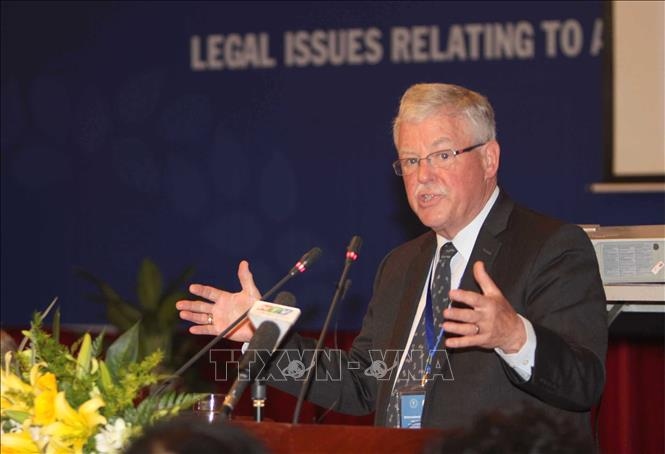Expert highlights huge potential for broader Vietnam-Australia ties
VOV.VN - The co-operative relationship between the nation and Australia over the past five years has recorded plenty of strong developments, particularly with the flexible implementation of bilateral mechanisms in both face-to-face and online forms.

This assessment was made by Prof. Carl Thayer, an expert on Vietnamese studies of the University of New South Wales (UNSW), during a recent media interview held on the occasion of the fifth anniversary of the strategic partnership which started in 2018.
The Action Program to implement the strategic partnership in the 2020 to 2023 period includes three main pillars, including strengthening economic links; deepening strategic, defence, and security ties; and building knowledge and innovation partnerships.
Evaluating the process of carrying out this programme, Prof. Thayer said that the first pillar is the most successful because economic-trade relations between the two countries have continued to develop by leaps and bounds, in which both sides have established an Investment and Trade Promotion Center in Melbourne in the state of Victoria. However, he said that Vietnamese agricultural products must strive to gain deeper access to the Australian market.
Regarding the second pillar, which is strategy, defence, and security, according to Professor Thayer this area of co-operation needs to be further promoted. Although the two countries signed a Memorandum of Understanding (MoU) on defence co-operation back in 2010, jointly engaged in peacekeeping assistance, conducted training schemes, and arranges visits by naval ships, engagement in this field needs to go further.
In addition, cooperation can occur in new areas such as sharing technology secrets, experience in ensuring network security, and how to operate unmanned aircraft.
According to him, the field of defence needs more practical activities, such as conducting submarine rescue drills and holding dialogues on maritime surveillance.
Concerning the third pillar, the Australian expert stated that this represents a new field and co-operation between the two countries here have not really developed as expected.
This field is booming and will happen occur rapidly, meaning it must be further boosted in the context that the nation witnessing strong innovation, with emerging companies such as Viettel going ahead with the transition to 5G network.
According to the expert, in the current situation, in addition to the three pillars mentioned, the two nations still have plenty of opportunities and great potential to improve linkages in the fields of agriculture, tourism, and climate change adaptation.
The two countries should therefore make every effort to effectively exploit these areas of co-operation, he said, adding that that Australia is in the process of innovating science and technology in the agricultural sector, with these innovations being shared with Vietnam.
Australia is in the process of making adjustments in regulations to facilitate more Vietnamese agricultural products to its market.
This comes as the Vietnamese side also operates more flights to the Australian market. Compared to before, travel between the two is significantly more convenient, with better air connections encouraging more Vietnamese to come to Australia.
Amid expectations that the relationship between the two countries will be elevated to a comprehensive strategic partnership, Prof. Thayer said that if it happens then the two nations will focus on trade-investment and defence-security.
According to him, both nations must promote and raise the annual Vietnam-Australia diplomatic-defence strategic dialogue mechanism 2+2 to ministerial level, whilst simultaneously bolstering ties between the National Assembly of Vietnam and the Parliament of Australia, with a view to deepening mutual understanding and resolving existing problems in bilateral relations.
He also supported the strengthening of bilateral leadership contact mechanisms, such as on the sidelines of ASEAN meetings and international forums.
Regarding climate change, Prof. Thayer said that this is an important area of co-operation for the two countries, while the issue of energy transition is quite "difficult" for both.
Australia is aiming to phase out fossil fuels that affects its fuel exports, while the Vietnamese side also needs to address issues such as traffic density and fossil fuel vehicles.
Assessing the prospect of future relations, Prof. Thayer said that both nations’ major agenda will focus on a number of areas, such as preparing to respond to situations that may arise with the next pandemic, boosting economic recovery amid the impact of inflation, ensuring food security, and taking measures to overcome the slow recovery of the national economy in the post-COVID-19 period.
With regard to the advantages and disadvantages in the next period of bilateral ties, he said that strategic trust is at a high level with the two countries having effective policy co-ordination.
Mutual political trust has been maintained despite the change in leadership after elections, with this being a positive and favourable sign, he went on to say.
Regarding difficulties, according to him despite having many co-strategic points as the two sides jointly back a safe regional environment by ensuring freedom of navigation, there are still some areas where the two countries have not reached a consensus.
Another issue is that the two sides need to boost the relationship to become a more reciprocal and equal relationship in the future so that both sides benefit in all fields, he added.
